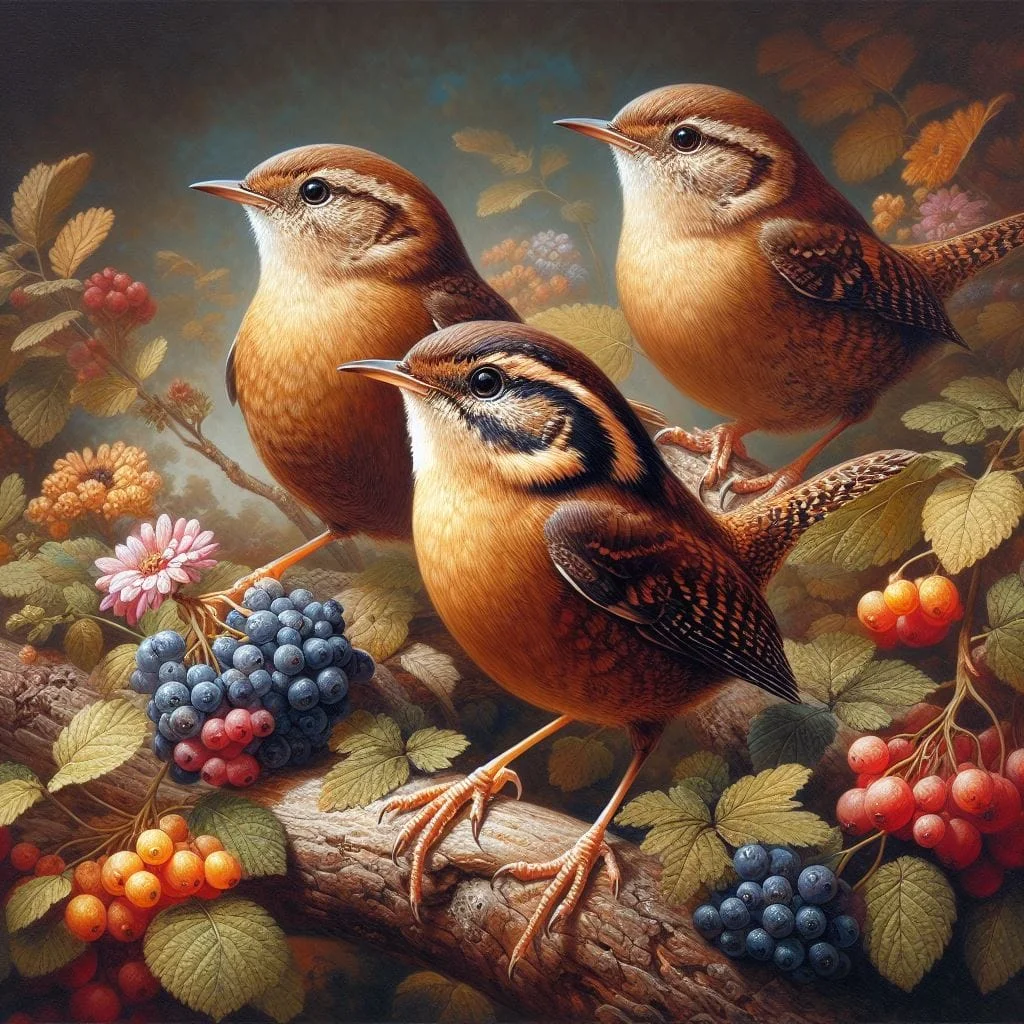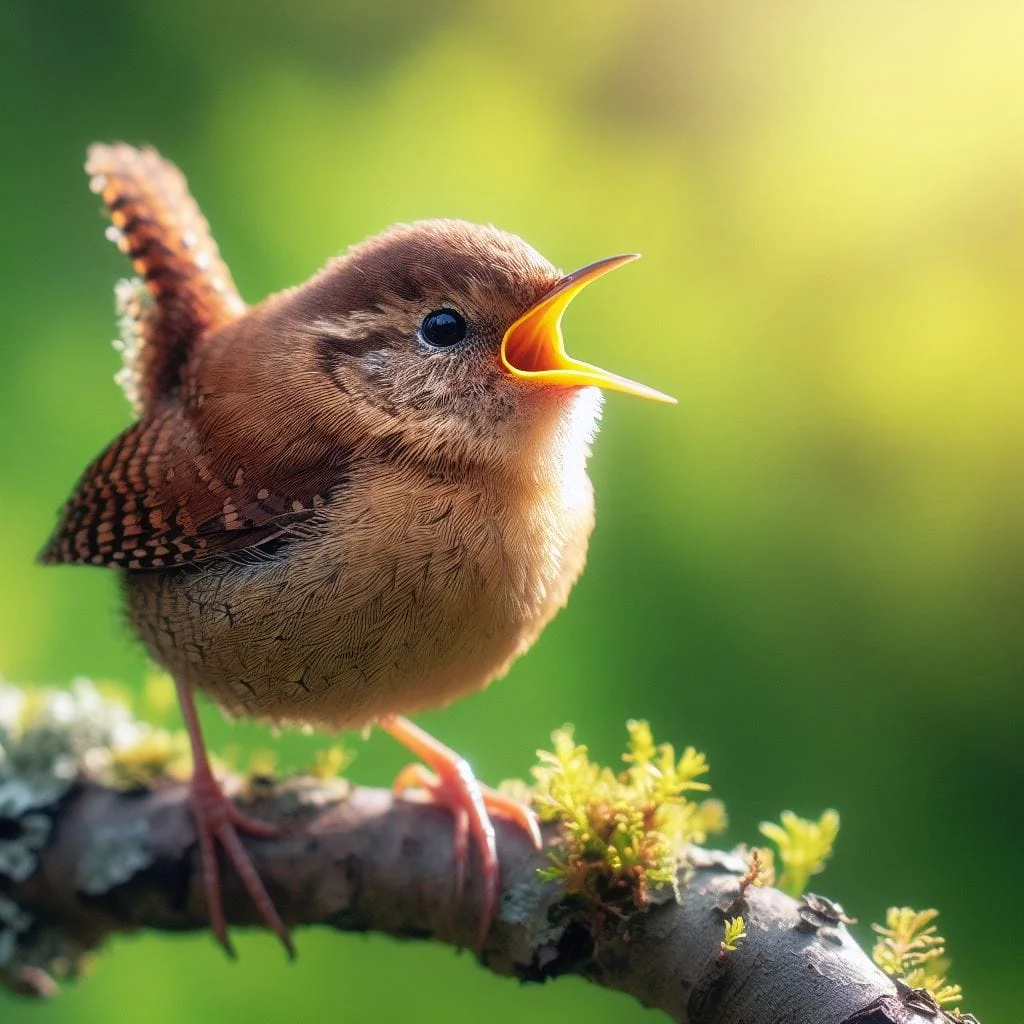biblical meaning of wren

Introduction
Wrens, a family of brown passerine birds in the family Troglodytical, are known for their symbolism and unique characteristics. In this blog, we will delve into the biblical meaning of wrens and explore their significance across different cultures. Join us on this fascinating journey to uncover the hidden depths of the wren’s symbolism.

The Eurasian Wren
The Eurasian wren, Troglodytes troglodytes, is the only species of wren found outside the Americas. It can be observed in Europe, Asia, and North Africa. Despite its small size, the wren has managed to capture our hearts with its delightful presence. In fact, it was even featured on the British farthing coin from 1937 to 1960, showcasing its popularity among the British population.

Size
The Eurasian wren stands out with its russet brown feathers, short tail, and relatively long thin bill. It is not the smallest bird in the UK, but it holds the title for being the shortest. With a length of 9 to 10 cm and a wingspan of 13-17 cm, this tiny bird weighs a mere 7 to 12 grams.
Meaning of the Wren
Wren – The Bird of Kings
Throughout European folklore, the wren has always been considered the king of the birds. From Aristotle to Plutarch, the wren has been referred to as the basileus (king) and basilisks (little king). In French, it is known as Roitelet, meaning little king, and in German, it is called Zaunkönig, translating to “king of the fence or hedge”.

Interestingly, the wren’s association with kingship extends beyond its name. In Celtic languages, the word for wren, such as “draouennig” or “drean”, also means druid bird, reflecting its connection to ancient Celtic culture. In Welsh, the word “dryw” signifies both druid and wren. Similar associations can be found in Germanic and Slavic languages.
The wren’s significance as a symbol of good fortune is notable. Many ancient cultures believed that harming the bird or its nest would bring about death by lightning. This taboo demonstrates the reverence and sacredness with which the wren was regarded.
Also Read This: Unlocking The Mysteries: The Spiritual Meaning Of The Number Of Crows Flocks
The Eagle and the Wren
Ancient fables, such as the one Aristotle, Plutarch, and Pliny wrote about, tell the story of a challenge among birds to determine the king of all birds. The wren, being a trickster figure, managed to outsmart even the mighty eagle and emerge victorious.

In this fable, the wren’s ability to navigate different realms is highlighted. It can fly high in the sky like the eagle, but it can also burrow underground, connecting the three worlds: the air, the ground, and the underworld. This symbolic association with Hermes, the messenger of the gods in Greek mythology, further adds to the wren’s mystique.
The Biblical Meaning of Wren
When exploring the biblical meaning of wrens, we find that these birds hold significant symbolism in various cultures. In the Celtic tradition, the wren represented the “little king” and was associated with the Summer Solstice, the day with the longest period of daylight and the shortest night of the year.

As the sun was considered the “king” symbolically, the wren, as the bird of the Summer Solstice, held a special place among all birds. Its behavior and song were used for divination, allowing people to gain insights and wisdom from observing the wren’s actions.
Also Read This: Spiritual Meaning Of Black Squirrel, Gray & Red Squirrel
What does seeing a wren symbolize?
Observing a wren is often seen as a symbol of resourcefulness and adaptability. The tiny bird’s ability to thrive in diverse environments becomes a metaphor for navigating life’s challenges. Culturally, wrens are associated with diligence, encouraging individuals to approach obstacles with resilience and quick thinking.
Why are wrens special?
Wrens captivate observers with their remarkable resilience despite their diminutive size. Their energetic songs and cheerful demeanor contribute to the enchantment of natural settings. The intricate nests they construct, often hidden in foliage, showcase a level of craftsmanship that belies their small stature, making them a special and charming presence in the bird kingdom.
What is the spiritual meaning of the Blue Wren?
The Blue Wren carries spiritual connotations of happiness, freedom, and intuition. Its vibrant blue plumage aligns with the throat chakra, symbolizing effective communication. Encounters with a Blue Wren are believed to bring positive energy, playfulness, and a heightened sense of intuition, creating a spiritual connection with the observer.

What is the wren known for?
Wrens are recognized for their small size, vibrant songs, and impressive adaptability. Despite their diminutive stature, they stand out for their resilience and ability to thrive in various habitats. Their contribution to the natural soundscape and their skillful nest-building further elevate their reputation among bird enthusiasts.
What do wrens mean spiritually?
Spiritually, wrens symbolize qualities such as diligence, quick thinking, and adaptability. Encounters with wrens may be interpreted as spiritual messages, encouraging individuals to approach challenges with resourcefulness and resilience. In different belief systems, the presence of wrens is often considered a positive sign, bringing messages of agility and creativity.
What is the meaning of the name Wren?
The name Wren, of Old English origin, carries the symbolism of the small bird. Choosing the name for a person suggests an appreciation for qualities associated with the bird, such as agility, liveliness, and a cheerful demeanor. It reflects a desire for the individual to embody the positive attributes attributed to wrens.
Is Wren a nice name?
Wren is generally perceived as a pleasant and charming name. Its simplicity and connection to nature make it appealing to those seeking a name with a unique and positive connotation. The name Wren exudes a sense of simplicity and elegance, contributing to its overall likability.
What does the name Wren mean for a baby?
Naming a baby Wren signifies a desire for the child to embody qualities associated with the bird, such as resilience, adaptability, and joy. The name connects the child to nature, suggesting a free-spirited and lively personality. Choosing the name Wren for a baby may express a hope for the child to embrace life with positivity and creativity.
What is special about wrens?
Wrens’ uniqueness stems from their small size, resilience, and adaptability. Their vibrant songs and energetic nature contribute to the enchantment of natural settings. The intricate nests they construct showcase a level of craftsmanship that belies their small stature, making them stand out in the avian world.
Why are wrens special?
Wrens are special due to their remarkable resilience and adaptability. Their small size doesn’t hinder their ability to bring joy to their surroundings through vibrant songs. Their talent for thriving in various environments and constructing intricate nests showcases a level of craftsmanship that sets them apart in the bird kingdom.
What God is associated with wrens?
In various cultures, specific gods may not be directly associated with wrens. However, wrens may be seen as symbols of divine qualities such as resourcefulness and adaptability, reflecting the creative diversity found in nature and serving as reminders of the divine intricacies within the natural world.
Are wrens a good bird?
Wrens are generally regarded as beneficial birds. Their diet includes insects, making them natural pest controllers. Their melodic songs and vibrant presence contribute positively to the ecosystem, enhancing the overall experience of nature for those who encounter them. Their adaptability and resilience make them valuable members of the avian community.

What is the legend of the wren?
Legends about wrens vary across cultures. In European traditions, the “Wren Day” or “Hunt the Wren” involves catching a wren and parading it in celebration. The significance can differ, with some considering it a symbol of good luck, while others view it as a ritual to ward off winter spirits. The legend underscores the diverse cultural interpretations of the wren.
What is the myth of the wren?
Myths about wrens are not as prevalent as legends, but some cultures may incorporate the wren into stories symbolizing cleverness or adaptability. These myths often highlight the bird’s ability to navigate challenges with agility, portraying it as a creature with unique qualities that offer lessons in overcoming adversity.
Are wrens intelligent?
While wrens may not display advanced problem-solving abilities like some larger birds, they exhibit a form of intelligence suited to their small size and lifestyle. Their intricate nest-building, ability to navigate various environments, and communication through songs reflect a level of avian intelligence that aligns with their unique characteristics.
Why do people like wrens?
People appreciate wrens for various reasons. Their small size, vibrant songs, and energetic nature contribute positively to the natural environment. The joy they bring to outdoor spaces through their cheerful presence often endears them to bird enthusiasts and nature lovers. Additionally, their resilience and adaptability make them intriguing and admirable creatures to observe and appreciate.
The Coming of Christianity
With the advent of Christianity in Ireland and the UK, a festival called the hunting of the wren arose. This festival was introduced during a time when the Christian belief system was being integrated into the pagan tribes as a means of unifying them against outside threats.

While the wren was symbolically “killed” and replaced by Catholicism, the memory of the Druids and their belief system was preserved in the costumes and rituals associated with the festival. The wren’s ability to invent stories and trick others adds to the intrigue surrounding its supposed demise.
It is worth noting that the wren continues to thrive in Ireland, coexisting with the belief system that seemingly replaced it. The wren’s status as a “trickster” and symbol of connection between different realms persists, reminding us of the importance of adaptability and wit in navigating life’s challenges.
Conclusion
The biblical meaning of wrens is a rich tapestry of symbolism and cultural significance. From its association with kingship and the ability to outsmart powerful beings to its role in the transition from ancient beliefs to new religious systems, the wren embodies adaptability, cunning, and wisdom.
Next time you spot a wren flitting among the trees or hear its sweet song, reflect on the multifaceted meanings behind this unassuming bird. The wren’s story is a reminder that even the smallest and seemingly insignificant creatures can carry profound symbolism and teach us valuable lessons about life.






